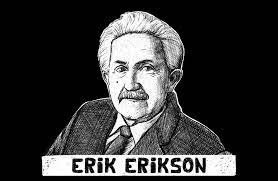Busy Bear Parents: Some historical information about Play and Learning!
Topic of the Month: Erik Erikson

Fun Facts:
* He was born in 1904 and died in 1994
*He NEVER received a formal degree!
* He based all of his knowledge on his reading and experiences. He was an avid reader!!
* He began his studies in psychoanalysis.
* He was the psychologist who came up with the theory of psychosocial theory and identity crisis.
- Mr. Erikson was born in Germany.
- He didn’t know his biological father, but was adopted by his stepfather.
- Mr. Erikson did not feel like his stepfather cared for him as much as his own children. This made him struggle during his youth. He felt as though he didn’t know what his identity was.
- He studied about the Montessori method!
- Mr. Erikson moved to Boston where he was the first male to practice child psychology in that area. He also worked in California, but ended his career back in Massachusetts.
So you ask, what is Psychosocial theory? What a great question!!
- Mr. Erikson believed that people have beliefs that focus on how people develop. He looked at both psychological and mental developing. He was very interested in how people used them to learn how to be a part of a community.
- Psychosocial theory has different stages of development. But we’re going to focus on how his stages effected beliefs in early childhood!
What stage are we looking at, so you ask? The answer is Stage 3: Initiative versus Guilt
Let’s get started!
- This stage covers the ages of 3-6 years old.
- Kids at this age really begin to want to try new things! They are curious and want to learn things.
- It’s so important that teachers and parents give them room to explore and discover. If they are surrounded by what people now call “helicopter” parents and teachers during this time they will feel guilty if they can’t finish their activities perfectly. Children need to be encouraged and allowed to discover, create, and explore.
- Children discover their identity by role playing. They need to pretend to be whoever they’d like in order to discover who they really are in real life. This is why we have our Dramatic Play Center. We have all different outfits and props for the children to use!
- Making choices is so important at this stage. Children need to know that they have choices and there are consequences (both positive and negative). If they are allowed to make choices, they will learn to not be afraid to try things or understand that it’s fine to make mistakes. This is why when you visit our class, you’ll see that the children are encouraged to try so many different actives!
- Mr. Erikson’s contribution to our ideas of what play-based learning continue on today. His belief that children need to gain their identity through play in order to be able to be a part of their community still resounds today. Many preschools base their curriculums on teachers being more of facilitators than formal educators.
Some after thoughts:
What are your thoughts about Mr. Erikson?
Do you have a different opinions about Play-based learning because of this?
What else would you like to know more about?
Here are some resources:
- GoodTherapyLLC copyright 2007-2021 goodtherapy.org Eirk Eirkson
- Erik Erikson’s Contributions to Early Childhood Education- blog Feb. 22, 2009 eirksongroup.blogspot.com
- Child & Adolescent Development: Overview Eirk Eirkson and Child Development Angela Oswalt, MSW gulfbend.org copyright CenterSite, LLC 1995-2021
- Erik Erikson Image taken from Google search